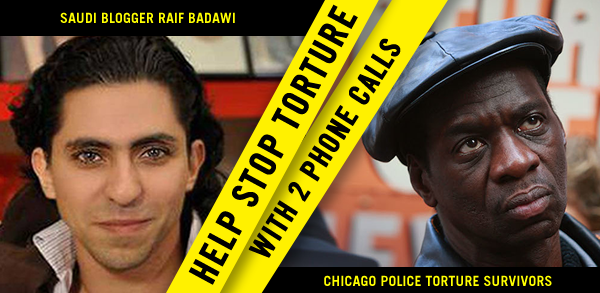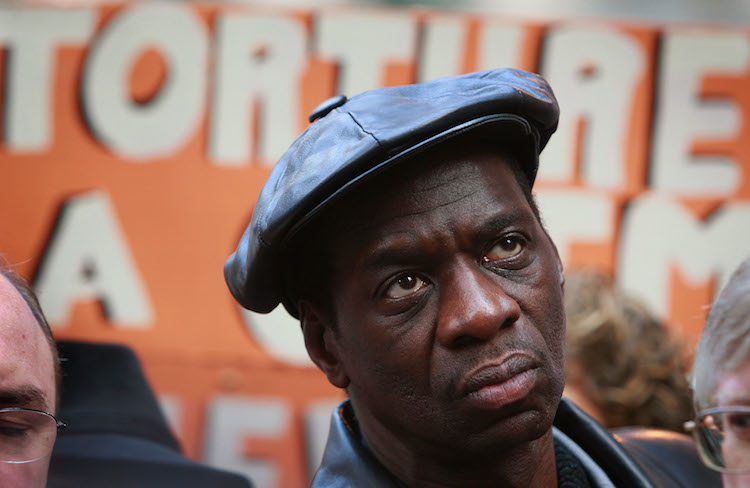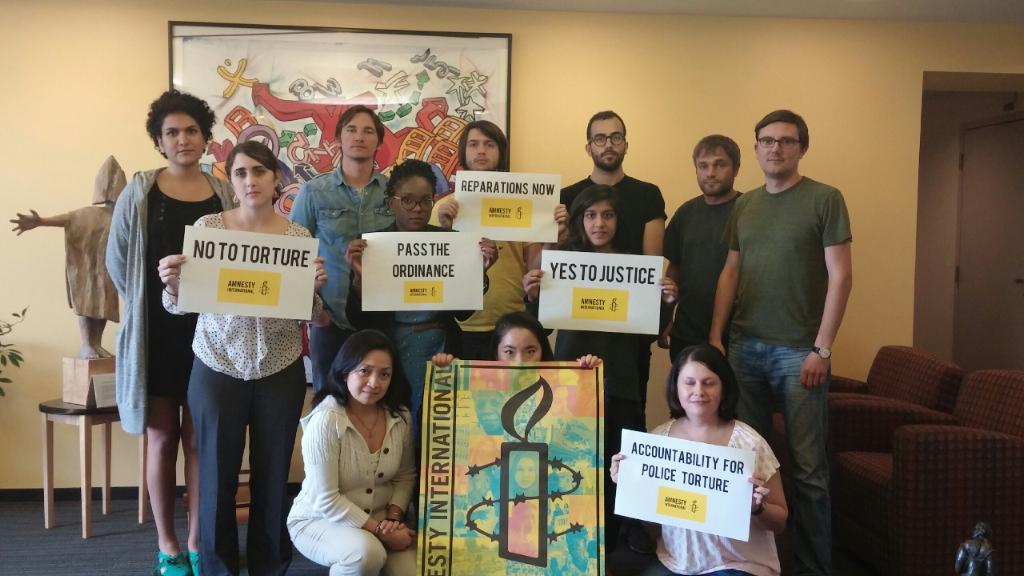
While the nation watches as the city of Baltimore awaits justice from the investigation of the role of Baltimore police in the death of Freddie Gray, Chicago has just made history in holding police accountable for abuse.

While the nation watches as the city of Baltimore awaits justice from the investigation of the role of Baltimore police in the death of Freddie Gray, Chicago has just made history in holding police accountable for abuse.

By Noor Mir, Field Organizer for Amnesty International USA
This Valentine’s Day, survivors of torture and other ill-treatment, from Jeddah to Chicago, will not be celebrating.
You can make a difference right this minute. SEE THE REST OF THIS POST

By G. Flint Taylor, Founding Partner, People’s Law Office and Advisory Board Member of the Chicago Justice Torture Memorials
In the early morning of November 2, 1983, Darrell Cannon was taken from his home by a battery of now notorious white Chicago police detectives to a remote area on the far southside of Chicago where he was interrogated about the murder of a drug dealer… When Cannon persisted in denials, the detectives forced him into the back seat of their car, pulled down his pants, and repeatedly shocked him on his genitals with an electric cattle prod.
The physical and mental scars that the victims like Darrell Cannon carry will never be healed, but with this reparations ordinance, at least they will finally begin the path to closure. Instead, Chicago Mayor Rahm Emanuel and several other Chicago Alderpeople will not support the reparations efforts.
 Former Chicago Police Commander Jon Burge is scheduled to be released from prison today after his 2010 conviction for lying about the torture of suspects in police custody. SEE THE REST OF THIS POST
Former Chicago Police Commander Jon Burge is scheduled to be released from prison today after his 2010 conviction for lying about the torture of suspects in police custody. SEE THE REST OF THIS POST
By Apoorvaa Joshi, Amnesty International USA Intern
 Yesterday a few Amnesty volunteers and I took to the streets of Chicago to collect petition signatures calling for justice for war crimes in Sri Lanka. My fellow intern stopped a woman on the street to ask for her signature:
Yesterday a few Amnesty volunteers and I took to the streets of Chicago to collect petition signatures calling for justice for war crimes in Sri Lanka. My fellow intern stopped a woman on the street to ask for her signature:
Intern: “Would you have a moment to sign a petition for war victims in Sri Lanka? I’m from Amnesty International.”
Woman: “What is that?”
Intern: “Amnesty International is an international NGO that focuses on human –“
Woman: “No, the petition. What is it for? Sri what?”
Intern: “Sri Lanka—we are asking Secretary Clinton to pressure the UN to launch an investigation about the abuses that occurred during their 1626-year-long civil war.”
Woman: “I’ve never heard of it. Did you just make that up?”
Intern: “No. It’s a real place. It’s off the coast of—“
“Is it in Africa?”
A few minutes later, the woman walked away having signed the petition, with educational materials in hand about Amnesty International, the situation in Sri Lanka, and where she can reach us for more information or to volunteer.
On July 7, Ronald Kitchen became a free man. Convicted of the murder of five people in 1988, he spent over a dozen years on Illinois’ death row facing execution, until former Governor George Ryan commuted his sentence, along with all other Illinois death sentences, to life without parole in 2003. But his conviction was based on a confession he gave to Chicago police after they tortured him. According to Kitchen, he was “hit in the head with a telephone, punched in the face, struck in the groin and kicked.” Tuesday, all charges against him were dropped, and he was released.
“If you’re getting whooped for over 39 hours and you’re constantly saying that you didn’t do it and they’re constantly doing what they’re doing, somewhere along the line you’re going to realize they’re not going to stop unless somebody gives in,” Kitchen said in a Chicago Sun Times article.
Kitchen’s wrongful conviction was one of many obtained by officers serving under Police Commander Jon Burge. During the 1970s and 1980s in Chicago, prisoners, mostly African American, were routinely tortured and abused into giving false confessions. Amnesty International reported on these and other abuses ten years ago. Because the arc of the universe bends towards justice, Burge now faces his own day in court, though for perjury and obstruction of justice charges, not torture.
Kitchen’s exoneration came in part thanks to the efforts of the Bluhm Legal Clinic at Northwestern University; but, despite the clear evidence of torture, it still took dozens of people years of work to win his freedom. As the video above makes clear, many others who may be equally innocent aren’t lucky enough to get that kind of support.
Amnesty International and other activists rally outside the Mexican Consulate in Chicago on March 6, 2006.
I just got back from an amazing week in Chicago, and I was trying to decide whether I should use the above as the title for this post, or if I should call it “Solidarity Means Hope,” because those were really the two main themes of the past week.
I was there to take part in a series of events in support of the Women of Atenco, including a forum at DePaul University, a rally outside the Mexican consulate, and a meeting with the Consul General. The events, planned by Amnesty International in conjunction with a wonderful coalition of Chicago-area organizations, were a great success. The forum was well-attended by both general public and the media, the rally had over 200 people filling up the whole street outside the consulate and attracting the attention of everyone inside and outside the building, and the meeting with the Consul was a great opportunity to communicate powerfully and directly the intense need for real justice in this case.
With me and my colleagues throughout all of these events was Claudia Hernandez, one of the survivors of the sexual and physical assaults that occurred during the police crackdown on protests in San Salvador Atenco, Mexico, in May 2006. Claudia is an amazing woman, and everyone who met her this past week was blown away by her insight, energy, hope and strength. It was an intense week for her, being asked so many times to relive the trauma she suffered in Atenco, but she told me over and over again that what got her through it, and the message she is taking back to her sisters in the struggle for justice, is the knowledge that they are not alone. She saw with her own eyes that people here not only know about the women of Atenco, but are also 100% committed to ensuring that justice is done.
That commitment was clear in the numbers of people who turned out for the events, the numbers of letters and petitions they signed, and the thoughtful and passionate questions they asked about the best ways to continue to support the women in their fight for justice. Take it from me: the people of Chicago don’t just talk about human rights, they put words into action!

© Private
The women of Atenco, Mexico, have been waiting more than two years for justice. On May 3-4, 2006, nearly 3,000 federal, state, and municipal police responded to protests by a local peasant organization. They arrested over 200 people – more than 45 of them women – without explanation. En route to the Santiaguito prison, many of the women were beaten and raped by the officers who arrested them. At least 26 women filed complaints, yet they still wait for an adequate response from the Mexican authorities.
On Thursday, March 5, from 4-6pm, Claudia Hernández, a survivor of the events at Atenco, will speak at an open forum at DePaul University in Chicago, Illinois. The following day, on Friday, March 6, Amnesty International activists will join coalition partners from Chicago area organizations from noon to 1pm, for a rally in front of the Mexican Consulate at 204 S Ashland St, Chicago, Illinois, to demand justice for the women of Atenco. Everyone will wear red in support of International Women’s Day on March 8 and to show our passion for justice.
Even if you can’t join the Chicago rally, you can still learn more about the case and other ways to take action.